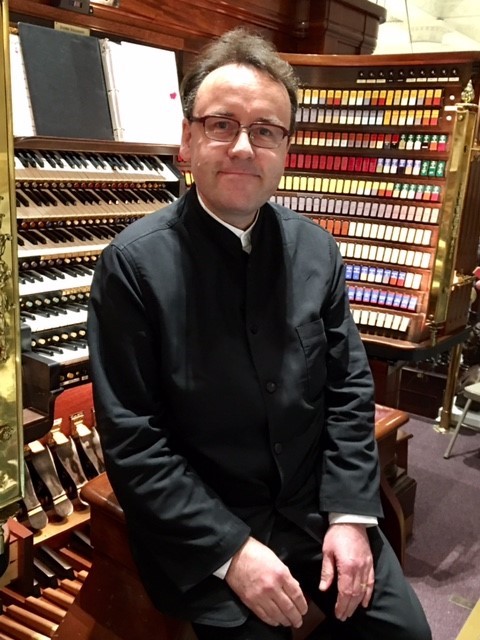My Life as an Organist

One of my earliest memories is of sitting on the organ bench with my grandfather who was Organist of a large anglo-catholic church in Birmingham UK for over forty years. He was a rather well-known liturgical improviser and I remember being blown away by all the stops, the buttons and the sheer sound of the instrument … especially the Pedal Trombone! When I was 9 years old I became a choirboy at Birmingham Cathedral and fell in love with the sound of the instrument even more. Sometimes I used to be allowed to improvise the voluntaries after Friday Evensongs - I hate to imagine what they sounded like - probably rather loud and definitely not overflowing in le bon goût! I knew from that age, though, that I really wanted to be an organist.
The great British Organist Peter Hurford (who famously founded the St Albans International Organ Festival and also was the first Brit to record the complete works of Bach, on mechanical action) gave me some very salient advice when I was appointed as Organist of Gloucester in 1994 - “take my tip, my boy, make sure that you do something which no-body else is doing”. I think it’s rather fun that not all organists play the same repertoire and sound the same! I’ve always loved orchestral music (especially from the late nineteenth century) and so have made a bit of a niche in transcribing the symphonies of Elgar, Tchaikovsky, Mahler and other works by composers like Maurice Ravel and J S Bach. I’ve also always loved to improvise, and probably about 1/3 of my concerts are silent movie improvisation concerts. I love being inspired by the visual image and find it very liberating.
These days I only play music which I’m really passionate about. One of many wonderful aspects about my job is that I get to perform on some of the world’s very finest instruments. Each time you rehearse you have to make very quick decisions, and foster a symbiotic relationship with the instrument. Concert pianists maintain that each Steinway is totally different, but I think organists are obliged to be even more flexible. It’s a two-way thing - a fine instrument can influence the way you play a particular piece, but you also have to find a way to communicate your own musical voice. The most important thing is to use your ears and to imbue each measure with rhythmic energy and expressive character. I also really love the process of practicing in a very organized way - for me it’s rather like a form of meditation. The target is to practice the music until you can’t get it wrong. I would say that it’s a constant ‘work in progress’!
The biggest misconception is that it is boring, grey, and something which people used to try to talk over while meeting people after church. I believe, very strongly, that the organ has the power to move people in a unique and deep way. It’s something about vibrations and resonance. My passion in life is to give newcomers their first taste of this marvelous feeling. Once it’s in the bloodstream, it’s rather hard to shake off. It can truly change peoples’ lives.
I’ve never driven a Maserati, but I imagine it’s a similar feeling to playing the Father Willis at Truro Cathedral. It’s very nippy, full of vitality and color, and with huge amounts of power under the bonnet, ready to unleash at the touch of a button or two. Part of Truro’s uniqueness is that it’s still original - very few English cathedrals can boast that. It also has a distinct acoustic advantage - rather rare in English cathedrals - in that it sits high up in its own fan-vaulted chamber and where the pipes can permeate the whole cathedral with clarity and a distinctive élan. The work that is being done over the next few months is all really essential and overdue - a new, state-of-the-art computerized mechanism to open and close the Swell box (in truth, this hasn’t worked properly for many years), and some much needed adjustment to the set-up and touch of the keyboards and pedal board. The organ won’t sound very different - it’s rather like a car going in for an in-depth 250,000 service. But it will be much more reliable and responsive, from the players point of view, and as all music-making is about the close relationship between composer-player-instrument, it’s extremely important that everything is mechanically in tip-top shape. At the moment it’s a bit like driving a Rolls-Royce with the steering slightly out of alignment.
David plays at the cathedral on the 6 June. More information

